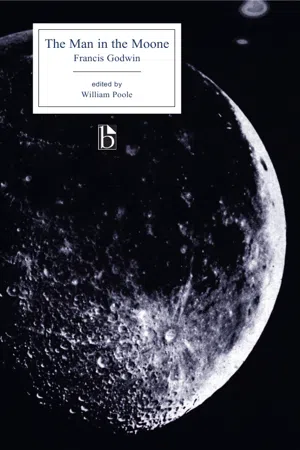
- 176 pages
- English
- ePUB (mobile friendly)
- Available on iOS & Android
The Man in the Moone
About this book
Arguably the first work of science fiction in English, Francis Godwin's The Man in the Moone was published in 1638, pseudonymously and posthumously. The novel, which tells the story of Domingo Gonsales, a Spaniard who flies to the moon by geese power and encounters an advanced lunar civilization, had an enormous impact on the European imagination for centuries after its initial publication. With its discussion of advanced ideas about astronomy and cosmology, the novel is an important example of both popular fiction and scientific speculation.
This Broadview Edition includes a critical introduction that places the text in its scientific and historical contexts. The rich selection of appendices includes related writings by Godwin and his predecessors and contemporaries on magnetism, human flight, voyages to real and unreal lands, and the possibility of extra-terrestrial life.
Tools to learn more effectively

Saving Books

Keyword Search

Annotating Text

Listen to it instead
Information
THE MAN IN THE
MOONE:
A DISCOURSE OF A
VOYAGE THITHER
BY
DOMINGO GONSALES
THE SPEEDY MESSENGER

To the Ingenious Reader.
THE MAN IN THE MOONE.
Table of contents
- Cover
- Title Page
- Copyright
- Contents
- Preface
- Acknowledgements
- Introduction
- Francis Godwin and his Contemporaries: A Brief Chronology
- A Note on the Text
- The Man in the Moone
- Textual Notes
- Appendix A: Francis Godwin, Nuncius Inanimatus (1629)
- Appendix B: From Lucian of Samosata, The True History
- Appendix C: From William of Newburgh, “On the Green Children” (1196-98)
- Appendix D: Arguments about Aliens (Philip Melanchthon, Tommaso Campanella, John Wilkins)
- Appendix E: From Jan Huygen van Linschoten, Discours of Voyages into the Easte and West Indies (1596)
- Appendix F: From Mark Ridley, A Short Treatise of Magneticall Bodies and Motions (1613)
- Appendix G: From Robert Burton, The Anatomy of Melancholy (1621, 1628)
- Appendix H: From John Wilkins, Mathematicall Magick (1648)
- Bibliography and Works Cited
Frequently asked questions
- Essential is ideal for learners and professionals who enjoy exploring a wide range of subjects. Access the Essential Library with 800,000+ trusted titles and best-sellers across business, personal growth, and the humanities. Includes unlimited reading time and Standard Read Aloud voice.
- Complete: Perfect for advanced learners and researchers needing full, unrestricted access. Unlock 1.4M+ books across hundreds of subjects, including academic and specialized titles. The Complete Plan also includes advanced features like Premium Read Aloud and Research Assistant.
Please note we cannot support devices running on iOS 13 and Android 7 or earlier. Learn more about using the app